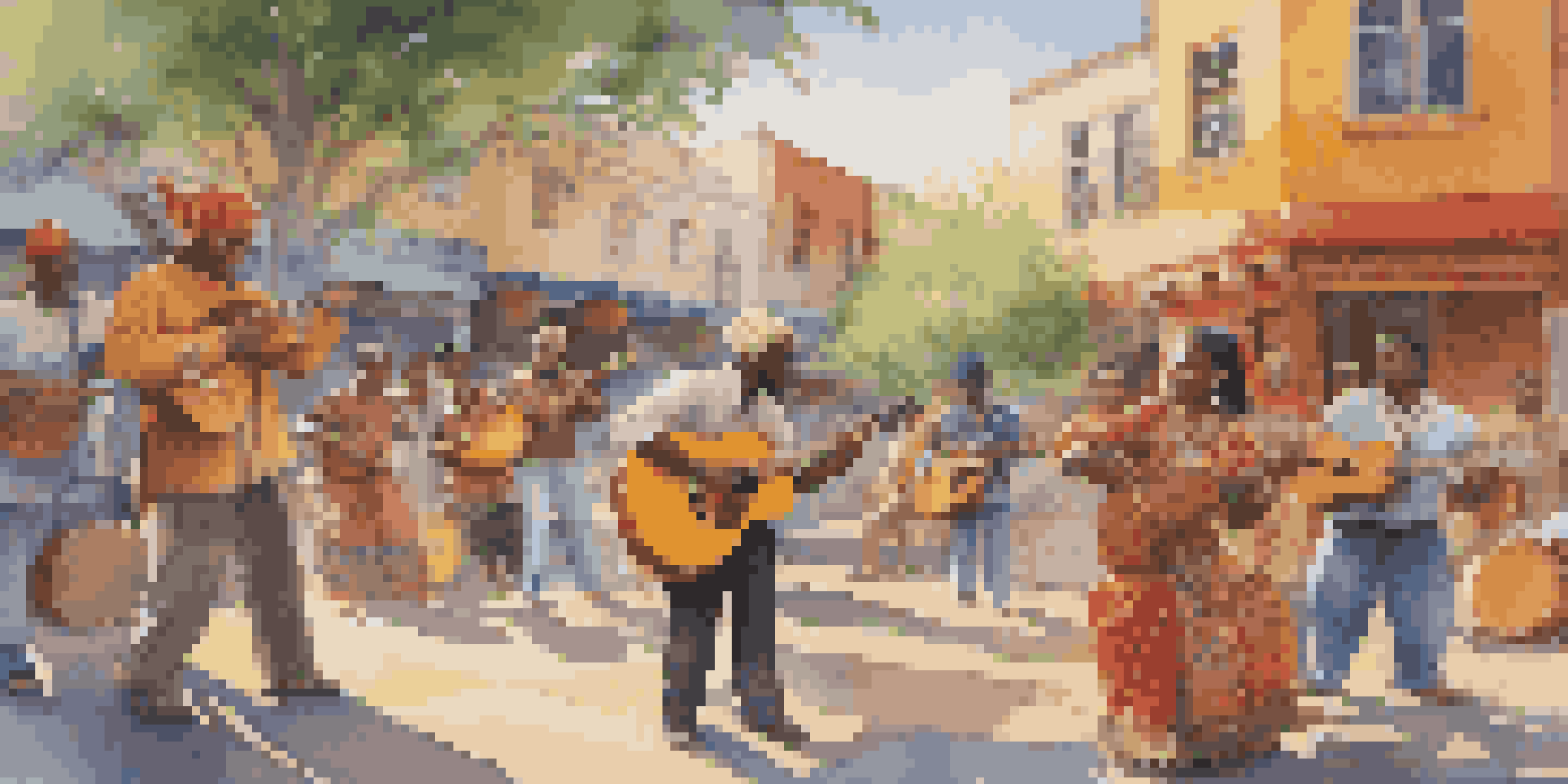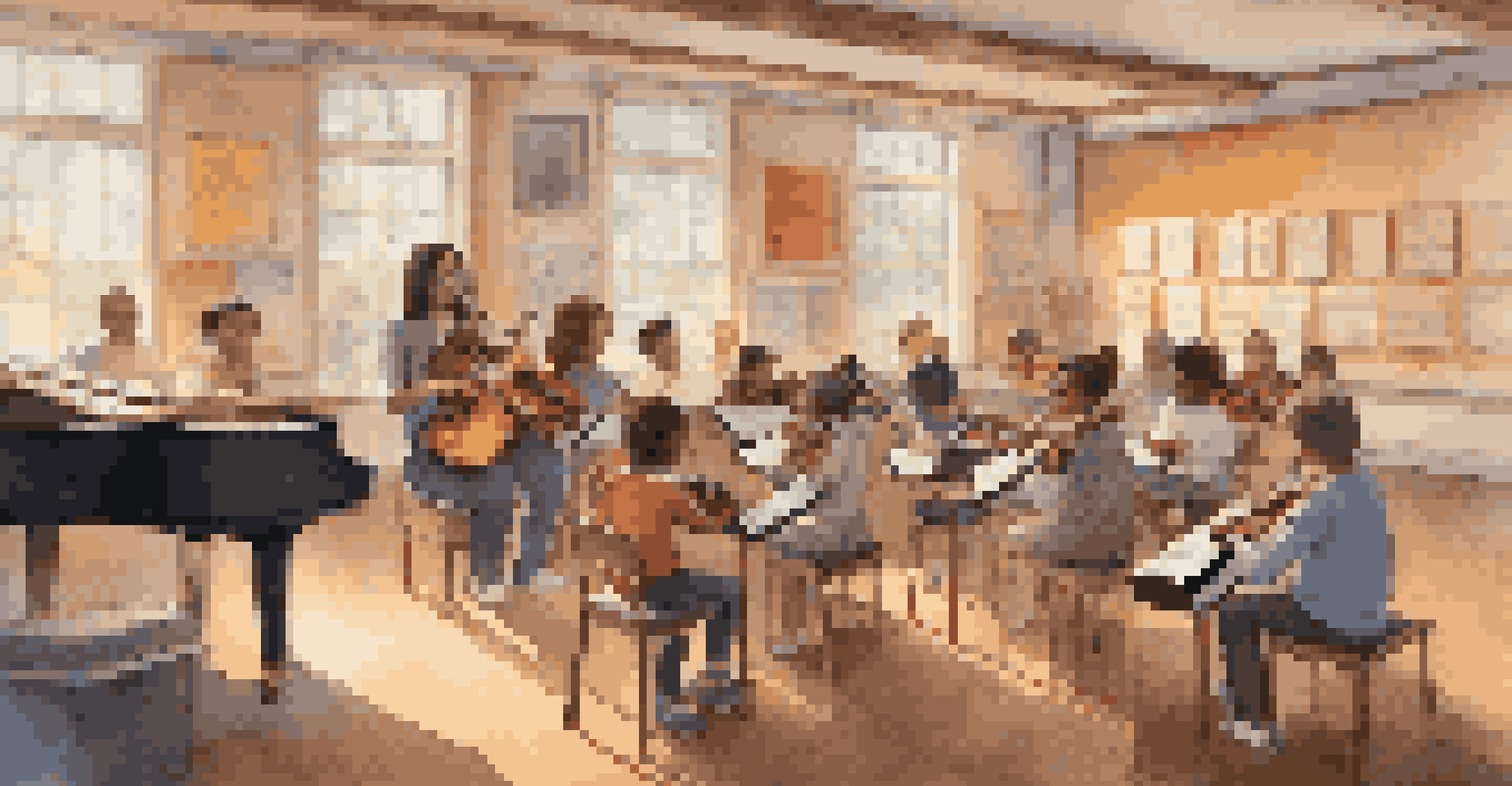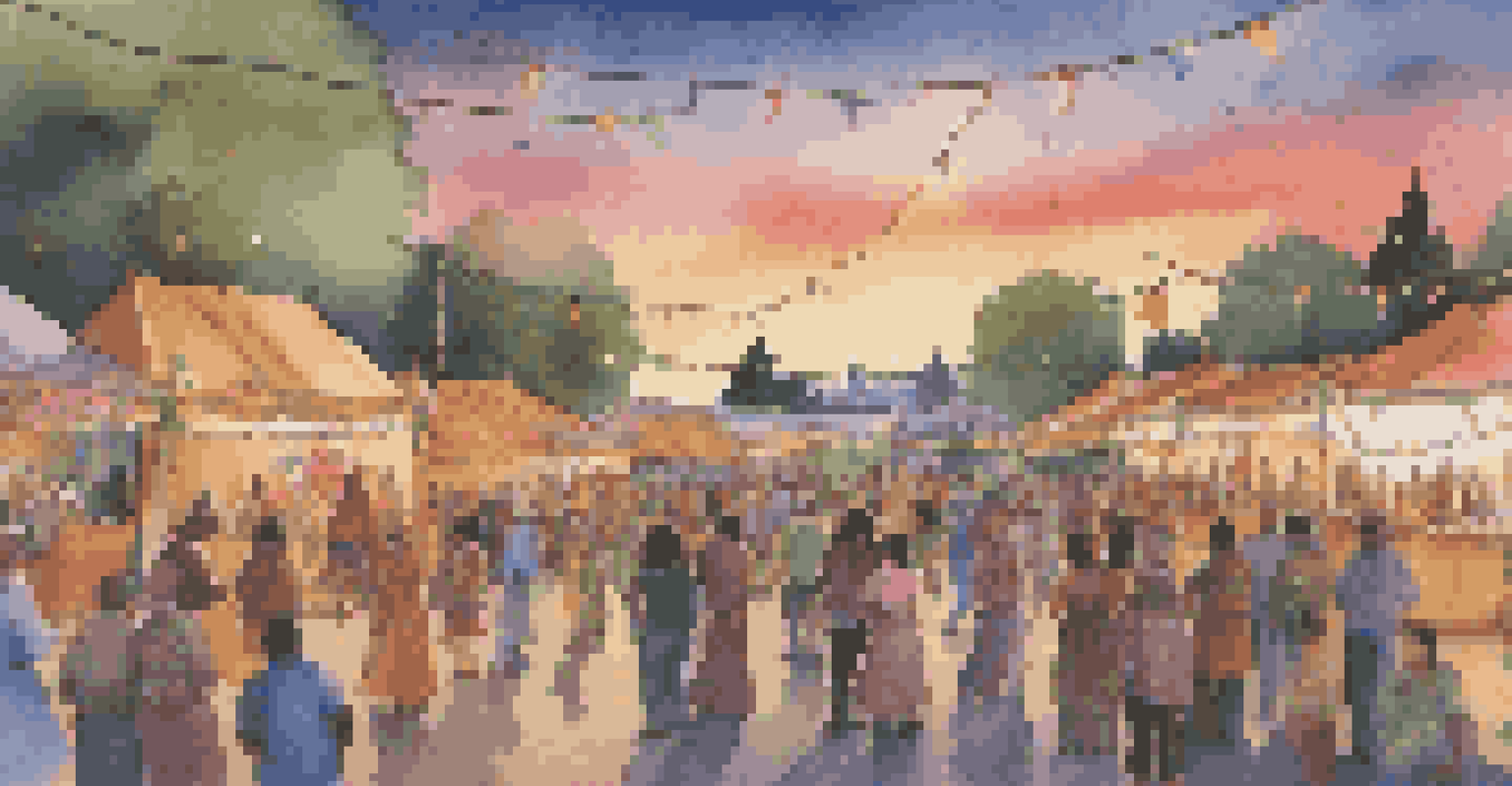Cultural Appropriation in Music: A Multi-Generational Perspective

Understanding Cultural Appropriation in Music
Cultural appropriation in music refers to adopting elements from one culture by another, often without permission or understanding. This can manifest in various ways, such as borrowing musical styles, fashion, or language. While music is a universal language meant for sharing, the line between appreciation and appropriation can sometimes blur, leading to contentious debates.
Cultural appropriation is often a symptom of a more significant cultural issue, reflecting power dynamics rather than a true exchange of ideas.
For instance, when artists from predominantly white backgrounds adopt hip-hop or reggae elements without acknowledging their origins, it can raise eyebrows. Critics often point out that such acts may contribute to the commodification of cultures, reducing rich traditions to mere trends. To navigate these waters, it’s essential to recognize the cultural significance behind the sounds and styles being used.
Understanding cultural appropriation requires a multi-generational perspective. Different age groups may have varying views on what constitutes appropriation versus appreciation. For younger generations, the concept of cultural exchange may feel more natural, but older generations might emphasize the importance of respecting cultural roots.
The Historical Context of Cultural Exchange
Music has always been a form of cultural exchange, with genres like jazz and blues emerging from the blending of African American and European musical traditions. However, this blending often occurred within a context of oppression and exploitation, making the conversation around appropriation more complex. Understanding this history helps explain why certain cultural elements are viewed as off-limits for appropriation.

For example, blues music has deeply rooted connections to African American experiences, and its appropriation by mainstream artists can evoke feelings of loss and misrepresentation. This historical context adds weight to the modern discussions about who gets to use what in music. Recognizing this past is crucial for fostering respectful engagement with different musical traditions.
Cultural Appropriation vs. Appreciation
The distinction between cultural appropriation and appreciation is often blurred, requiring sensitivity and acknowledgment of cultural origins in music.
As society evolves, so do perspectives on cultural exchange. While younger musicians might see collaboration as a way to innovate and connect, older generations may advocate for a more cautious approach. This generational divide highlights the importance of ongoing dialogue about cultural sensitivity and mutual respect in music.
Generational Perspectives on Music Genres
Different generations have distinct relationships with various music genres, shaped by their social contexts. Baby boomers might have strong ties to rock and folk, genres that often drew from cultural movements of their time. In contrast, millennials and Gen Z have grown up in a more globalized world, where genres like K-pop and reggaeton have gained immense popularity, leading to new discussions about cultural boundaries.
Music is a powerful tool for social change, but it must come with responsibility and respect for the cultures that influence it.
For instance, while older generations may criticize modern pop artists for appropriating styles from marginalized communities, younger listeners often celebrate these influences as signs of a more interconnected world. This generational gap can create friction, as older audiences may perceive appropriation where younger fans see innovation. Understanding these perspectives is key to navigating the conversation around cultural appropriation in music.
Ultimately, each generation brings its own values and experiences to the table, shaping how they perceive and engage with music. As music continues to evolve, so too will the discussions around cultural appropriation, making it vital for all generations to communicate openly about their views.
The Role of Social Media in Music Appropriation
In today’s digital age, social media plays a significant role in how we consume and share music. Platforms like TikTok and Instagram allow for rapid dissemination of musical styles and trends, often leading to cultural borrowing. However, this also means that instances of cultural appropriation can be amplified and scrutinized in real-time, sparking conversations across the globe.
For example, when an artist uses a traditional sound from another culture without acknowledgment, social media users can quickly call them out, leading to viral discussions on appropriation. This immediate feedback loop can pressure artists to be more mindful of their influences. However, it can also lead to misunderstandings and accusations without context, complicating the dialogue.
Generational Perspectives Matter
Different generations perceive cultural exchange and appropriation differently, highlighting the importance of open dialogue about cultural sensitivity.
While social media enables artists from diverse backgrounds to connect and collaborate, it also challenges them to navigate cultural sensitivities. Understanding the impact of social media on music appropriation is essential for both artists and audiences, as it shapes perceptions and fosters discussions about respect and authenticity.
The Fine Line Between Influence and Appropriation
Influence and appropriation often reside on the same spectrum, making it difficult to draw clear lines. Many artists have cited their inspirations from various cultures, leading to beautiful mash-ups that celebrate diversity. However, when these influences come from marginalized communities without proper recognition, they can cross into the territory of appropriation.
Take the case of pop stars who incorporate elements of traditional music into their work. If they acknowledge their sources and collaborate with the original artists, it can lead to a richer, more respectful music landscape. Yet, when they fail to give credit, it not only risks appropriation but also undermines the cultural significance of the music they borrow.
Navigating this fine line requires a deep understanding of the cultural context from which these influences arise. Artists must strive to engage authentically with the cultures they draw from, fostering a sense of respect and appreciation rather than exploitation. This balance is crucial for creating a thriving, diverse musical ecosystem.
Promoting Cultural Sensitivity Through Education
Education plays a pivotal role in promoting cultural sensitivity in music. By understanding the histories and meanings behind various musical genres, artists and audiences can engage more thoughtfully with different cultures. Workshops, seminars, and online courses can provide insights into the importance of cultural context and the implications of appropriation.
For instance, music programs that emphasize the origins of different styles can help students recognize the significance of cultural elements. This knowledge can empower them to approach their music-making with respect and intention. When artists are educated about the cultures they draw from, they can create music that honors those traditions rather than appropriates them.
Education Promotes Cultural Sensitivity
Educational initiatives can empower artists and audiences to understand cultural contexts, fostering respectful engagement with diverse musical traditions.
Furthermore, fostering open conversations about cultural sensitivity can lead to greater awareness and understanding. As artists learn to appreciate the richness of diverse musical traditions, they can contribute to a more inclusive and respectful music industry. Education is a powerful tool in bridging generational gaps and fostering collaboration across cultures.
The Future of Cultural Appropriation in Music
As we move forward, the landscape of music will continue to evolve, and so will the discussions surrounding cultural appropriation. With a growing emphasis on diversity and inclusion, there is potential for more respectful collaborations between artists from different backgrounds. This shift could lead to a richer tapestry of music that honors its cultural roots while pushing creative boundaries.
However, this future also depends on the willingness of artists and audiences to engage in thoughtful discussions about appropriation. Acknowledging the complexities of cultural exchange will be crucial in shaping a music scene that values authenticity and respect. As new generations of musicians rise, they have the opportunity to redefine how we view cultural influences in music.

Ultimately, the future of cultural appropriation in music lies in a collective commitment to understanding and respecting each other's cultural narratives. By fostering an environment where cultural exchange is celebrated and appropriation is critically examined, we can create a music landscape that is both innovative and respectful.